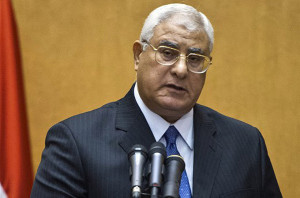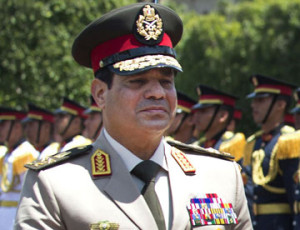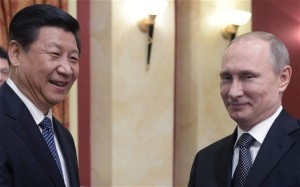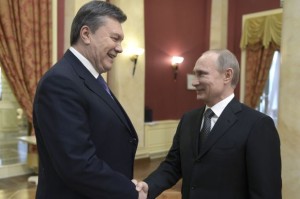News from Egypt, Ethiopia and Russia
Tuesday's World Events — Posted on February 11, 2014

Egypt’s interim President Adly Mansour
Egypt will elect a president before voting on a parliament, interim President Adly Mansour said on January 26, amending a road map laid down last summer.
Parliamentary elections were supposed to be held first under a timetable agreed to after Egypt’s army deposed Islamist President Mohamed Morsy in July following mass protests against his rule.
Voters in the Arab world’s most populous nation this month overwhelmingly approved a new constitution with 98.1% in favor, the Electoral Commission said.
“I had previously held a series of sessions for dialogue with some of the major political stakeholders and representatives of the different political groups which indicated a majority in favor of holding presidential elections first,” Mansour said in a televised address.

Egypt’s army chief Gen. Abdel Fattah el-Sisi
“In this light, I have taken the decision to amend the road map for the future, so that presidential elections are held first, and are followed by parliamentary elections.”
Mansour did not give dates for the elections.
Egypt’s army chief Gen. Abdel Fattah el-Sisi has said he would run for president if the Egyptian people wanted him to, state media reported recently.
ETHIOPIA and EGYPT – Battle of the Nile: Egypt, Ethiopia clash over mega-dam
KHARTOUM, Sudan | Egypt and Ethiopia remain at loggerheads over Addis Ababa’s plan to build a $4.2 billion, 6,000-megawatt dam on a major tributary of the Nile River that Cairo says will greatly reduce the flow of water that is Egypt’s lifeline.
Tension between the two African states rose sharply in January after Ethiopia rejected Egypt’s demand it suspend construction of the Grand Ethiopian Renaissance Dam on the Blue Nile, the main tributary of the 4,130-mile river, the world’s longest.
 Egypt has vowed to protect its “historical rights” to the Nile “at any cost” and says it could lose 20 percent of its water if the giant dam in northwestern Ethiopia, one of several hydroelectric projects planned by Addis Ababa, is completed.
Egypt has vowed to protect its “historical rights” to the Nile “at any cost” and says it could lose 20 percent of its water if the giant dam in northwestern Ethiopia, one of several hydroelectric projects planned by Addis Ababa, is completed.
“It would be a disaster for Egypt,” Mohamed Nasr Allam, a former Egyptian water minister, lamented to the Guardian daily of London in 2013. “Large areas of the country will simply be taken out of production.”
Despite Cairo’s tough declarations, and Addis Ababa’s insistence on pressing ahead with the massive dam — which it denies will damage Egypt to any critical extent — there’s little likelihood of the two states going to war, if only because of the vast distance that separates them. …
Ethiopia’s Chinese-backed dam program will, if completed, produce abundant supplies of electricity that could transform the economies of the regional states long mired in poverty.
Egypt’s position has been seriously weakened by the December defection of Sudan, its southern neighbor and longtime ally, in the Nile dispute with Ethiopia and other upstream African states.
That has left Egypt isolated in a long-running dispute with those states, which all want a greater share of the Nile water than they are accorded under British colonial era agreements that gave Egypt, and Sudan to a lesser extent, the lion’s share of the river’s flow. …
In 2010, Ethiopia, Rwanda, Tanzania, Uganda and Kenya signed an accord, the Cooperative Framework Agreement, to negotiate a more equitable water-sharing arrangement. They were later joined by Burundi , the Democratic Republic of Congo, Eritrea and South Sudan.
These upstream African nations, former colonies of the 19th century European powers, all say they need greater access to the Nile’s flow to meet swelling demographic and industrial demands from a waterway that has sustained civilizations for millennia.
Much depends on how the current dispute plays out. Right now, an estimated 238 million people depend on the Nile to some extent.
RUSSIA – Western leaders stay away from Sochi Olympics
When the Winter Olympics opened in Sochi, Russia, Friday, no major Western leaders joined Russian President Vladimir Putin in the VIP section.
No Barack Obama, no David Cameron, no François Hollande, no Angela Merkel.
But Asian leaders, and the heads of post-Soviet states on Russia’s western flank, were there in full force.
The divide offered a vivid picture of where Russia – and its ambitious, nationalist leader, Mr. Putin – stand in the world today.
President Obama’s vaunted (highly or widely praised) “reset” with Russia has long since fallen on hard times, leaving US-Russia relations today dominated more by disagreements over Syria, Edward Snowden, and human rights inside Russia. With the NSA leaker sitting in Moscow and still divulging information from his purloined intelligence documents, Obama and all other senior Obama administration officials took a pass on the Games.
The Western Europeans – in a tug of war with Russia over the political turmoil in Ukraine; like Washington, unhappy with Russia’s staunch backing of Syrian President Bashar al-Assad; and also getting an earful from their domestic human rights advocates about conditions in Russia – also decided to stay home.
But that does not mean the world is snubbing Sochi.

Russian President Vladimir Putin, right, shakes hands with Chinese President Xi Jinping at the Olympic reception Photo: AP
China’s President Xi Jinping is there, as is Japanese Prime Minister Shinzo Abe – both from neighboring countries that have crucial energy ties to Russia, and both of which would love to win Russia’s support in their increasingly bitter regional rivalry. Joining them is Turkish Prime Minister Recep Tayyip Erdogan.
And a Russia that in some quarters is still smarting from the loss of the Soviet empire may take some solace in the fact that at least eight leaders of former Soviet republics are on hand in Sochi. Perhaps no leader will be more closely watched than Ukraine’s President Viktor Yanukovich, who was blasted for heading to Sochi while home [is in turmoil].

Russia’s President Vladimir Putin (R) shakes hands with his Ukrainian counterpart Viktor Yanukovich prior to the 2014 Winter Olympic Games opening ceremony in Sochi, February 7, 2014. REUTERS/Alexei Nikolsky/RIA Novosti
In all, more than 60 national leaders and heads of international organizations will attend the Games, said Dmitry Chernyshenko, head of the 2014 Sochi Organizing Committee, in remarks to the press on Thursday. To underscore Russia’s perspective that the world is coming to Sochi, Mr. Chernyshenko noted that the cohort of heads of state and government is the largest ever to attend a Winter Games.
To drive home the point, he said the number of world leaders in Sochi is about triple the number that attended the 2010 Vancouver Games. So there, he might have added.
(The news briefs above are from wire reports and staff reports posted at CNN on Jan. 26, UPI and CSMonitor on Feb. 7.)
Questions
1. For each of the 3 countries, provide the following information:
a) capital:
b) location/the countries that share its borders:
c) the religious breakdown of the population:
d) the type of government:
e) the chief of state (and head of government if different) [If monarch or dictator, since what date has he/she ruled? - include name of heir apparent for monarch]:
f) the population:
[Find the answers at the CIA World FactBook website. For each country, answers can be found under the "Geography" "People" and "Government" headings. Go to worldatlas.com for maps and a list of continents.]
NOTE: Before answering the questions below, read the info under “Background” and “Resources.”
2. For EGYPT:
a) list the who, what, where and when of the news item
b) Who said he would run for president if the Egyptian people wanted him to?
3. For ETHIOPIA and EGYPT:
a) list the who, what, where and when of the news item
b) How has the government of Ethiopia responded to Egypt's opposition to the dam project?
c) Despite the Egyptian government's strong objection to Ethiopia's dam project and vow to protect its "historical rights" to the Nile "at any cost," why do the reporters say there is little likelihood of the two countries going to war?
d) Egypt says it will lose 20% of its water if Ethiopia builds the dam. These Nile Basin countries want what they call an equitable water-sharing agreement that would allow for more irrigation and power projects. Egypt, a mostly arid country that relies on the Nile for the bulk of its water needs, argues that upstream countries could make better use of rainfall and have other sources of water. What do you think? If Ethiopia goes ahead with the dam project, should Egypt take military action? Should Egypt give up some of its water rights and let the other countries have 20% of their water?
4. For RUSSIA:
a) list the who, what, where and when of the news item
b) Why isn't President Obama attending the Olympics in Socchi?
c) Do you think President Obama should have attended the Olympic games? Why or why not?
Background
ETHIOPIA and EGYPT:
- Despite political turmoil in both Egypt and China-backed Ethiopia in recent months -- the July 2013 military coup in Cairo that ousted Egypt's first democratically elected president, and the 2012 death of longtime Ethiopian strongman Prime Minister Meles Zenawi -- both sides have dug in their heels over the Nile crisis.
- Egypt, with 82 million people, is the most populous and the most militarized state of the 11 riverine states along the Nile, which rises in the highlands of Ethiopia.
- But with Sudan now "so squarely in Ethiopia's camp, Egypt could not stage a ground attack on the dam," observed Hassen Hussein, a leader of Ethiopia's largest ethnic group, the Oromo, in an analysis on al-Jazeera Thursday.
- An airstrike on the dam, 20 miles from Sudan's southern border in the vast Blue Nile gorge, "is still possible, but fraught with risks.
- "To Egypt, water security equals national security," Hussein noted. "To Ethiopia, the dam has become a matter of national pride.
- "An airstrike could turn the clock back on the dam. Although Ethiopia lacks the means to respond to such an attack in kind, Egypt risks earning the international community's wrath and seeing its relationships with sub-Saharan Africa strained."
- But these relations are already strained over Egypt's claim that it has rights to 87 percent of the Nile's waters that were guaranteed under British-inspired treaties in 1929 and 1959 that also gave Cairo veto power over dam-building by upstream states.
- Egypt was allocated 55.5 billion cubic meters a year of the Nile's flow rate of 84 billion cubic meters. Sudan, then Egypt's ally, got 18.5 billion cubic feet.
- The Blue Nile joined the White Nile at Khartoum, capital of Sudan, to flow northward to the Mediterranean. (from the UPI article above)
The Nile River Basin
- The source of the Nile, the longest river in the world, is Lake Victoria.
- It is comprised of the White and Blue Niles. It stretches from the Kagera river in Burundi to the Mediterranean Sea in Egypt.
- Shared by 10 countries – Burundi, Democratic Republic of Congo, Egypt, Eritrea, Ethiopia, Kenya, Rwanda, Sudan, Tanzania and Uganda – it runs 6,741km.
- The overall population of these countries is over 300 million people. More than 160 million live along the Nile Basin.
and from wikipedia.org
- The Nile is a major north-flowing river in Africa, generally regarded as the longest river in the world.
- The Nile has two major tributaries, the White Nile and Blue Nile, the latter being the source of most of the Nile’s water and fertile soil, but the former being the longer of the two.
- The White Nile rises in the Great Lakes region of central Africa, with the most distant source in southern Rwanda, and flows north from there through Tanzania, Lake Victoria, Uganda and southern Sudan, while the Blue Nile starts at Lake Tana in Ethiopia, flowing into Sudan from the southeast. The two rivers meet near the Sudanese capital of Khartoum.
- The northern section of the river flows almost entirely through desert, from Sudan into Egypt, a country whose civilization has depended on the river since ancient times.
- Most of the population and cities of Egypt lie along those parts of the Nile valley north of Aswan, and nearly all the cultural and historical sites of Ancient Egypt are found along the banks of the river. The Nile ends in a large delta that empties into the Mediterranean Sea.
RUSSIA ON THE OLYMPIC GAMES:
Putin has sought to remain above the undignified talk of numbers, emphasizing instead that Sochi will be an opportunity for leaders not just to marvel at athletic exploits, but to discuss some of the world’s most pressing issues as well.
“I can talk to colleagues about security, economy, the Middle East, Afghanistan,” Putin told journalists as he toured the Olympic Village earlier this week. “Syria, Ukraine, lots of them, you know,” suggesting the breadth of issues that leaders could discuss during the Games would make Sochi something of a mini-United Nations.
And indeed, UN Secretary-General Ban Ki-moon will be in attendance – although he punctuated a press conference Thursday with a blast at any form of discrimination against gays and lesbians. Mr. Ban did not refer specifically to Russia in making his point, but the issue of anti-gay legislation is a key reason Western leaders are snubbing the Games.
Small hints have surfaced to suggest the Russian leadership is none too happy with the Western no-show. The clearest rebuke came from Foreign Minister Sergeu Lavrov, who dismissed as “nonsense” the tallying of leaders’ attendance and the report card on Sochi that many, particularly in the media, are trying to make of it.
“No one has ever counted,” Mr. Lavrov told the Russian news agency RIA Novosti, as he participated in the Olympic torch relay in Sochi on Thursday. “They started counting when they decided that they should spoil things for Russia so that Russia would feel uncomfortable.”
The hint of bitterness in Lavrov’s observation reflects the surprise and resentment that Russia’s top leadership feels at seeing the Western emphasis on the problems at Sochi, ranging from the worrisome terrorist threat to how any LGBT athletes might be treated there, some Russia experts say.
“They see a tendency to accentuate the negative, which is not the narrative Russia wanted,” says Andrew Weiss, vice president for studies and a Russia expert at the Carnegie Endowment for International Peace in Washington. The message Sochi is meant to convey, he adds, is above all, “Russia is back.”
Others say any official bitterness may reflect how the West’s portrayal of Sochi is playing with average Russians.
“Emphasizing the negative strengthens the hand of the isolationists inside Russia,” says Dmitri Trenin, director of the Carnegie Moscow Center. While it may not be the intent, the Western criticism leaves many Russians with the sense that the West is “ganging up on Russia,” he says.
But some Russians, on the other hand, just seem to want the Games to go on without the soured whiff of politics. The Russian rock musician Andrey Makarevich has sung many a lyric critical of the Kremlin and the direction Russia is taking. But he is in Sochi for the Games, he says, and will leave his protests for a later date.
“For these two weeks, you have to call a truce,” he told Time magazine, in words he might have meant for the outside world. “We have to pause all the politics and let the Games be a celebration,” he said. “When it’s over, we can go back to criticizing each other.” (from the csmonitor article above)
